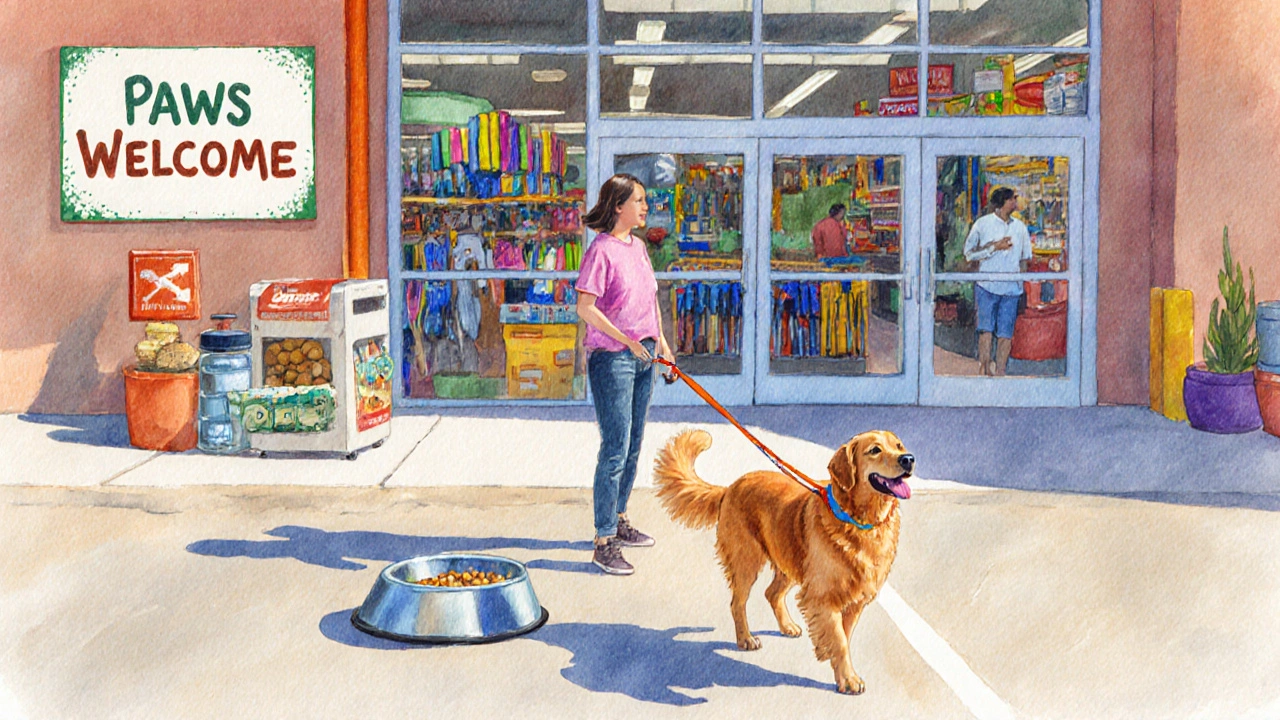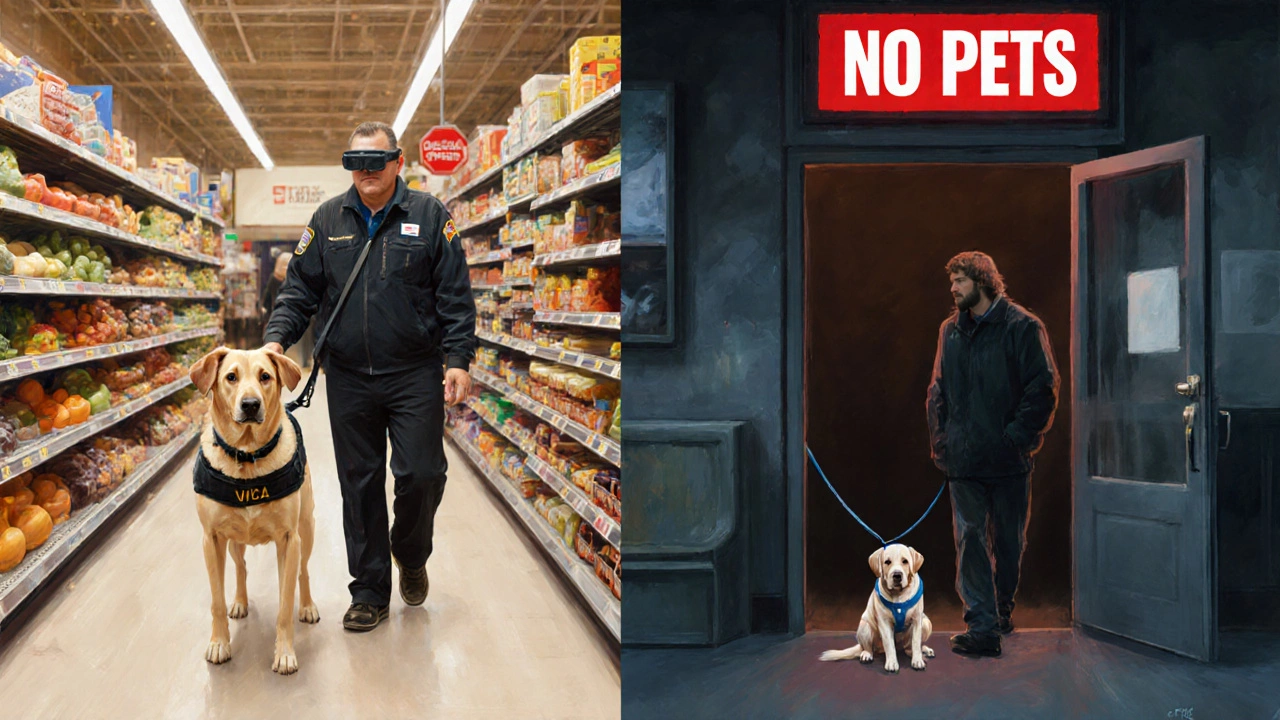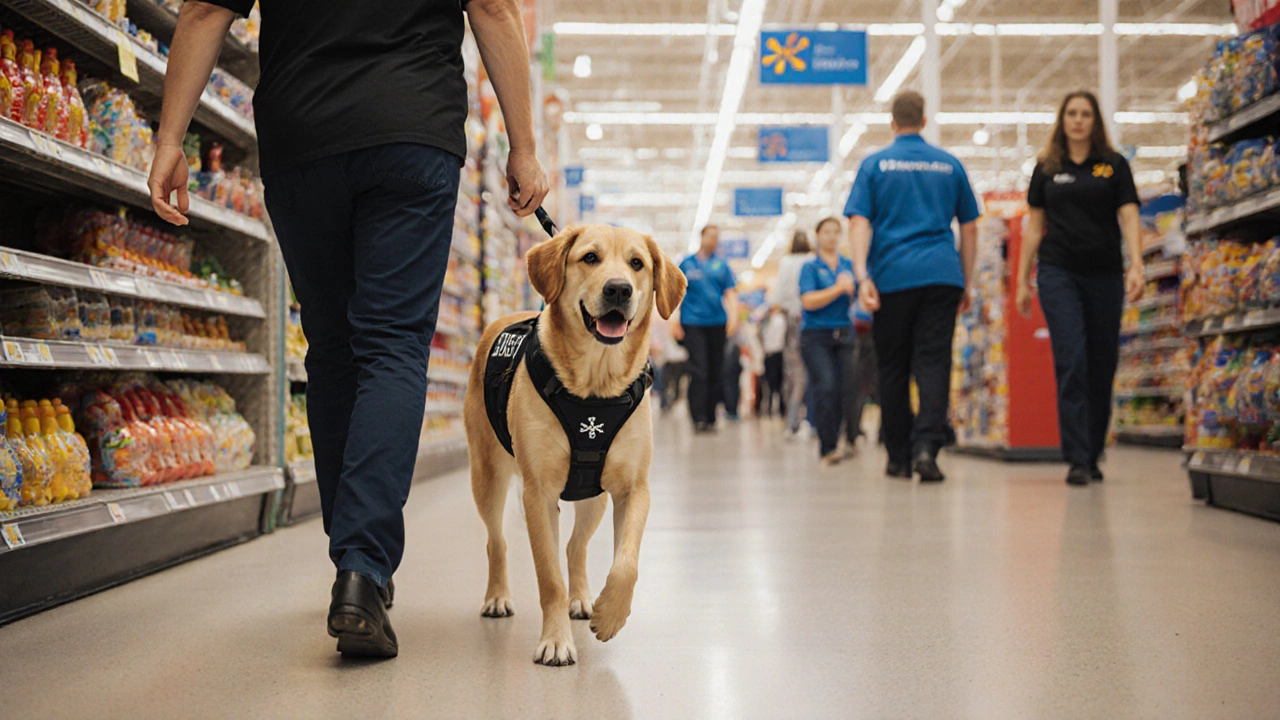Walking into a store with your dog in North Carolina can feel like a gamble. One store greets you with a wagging tail and a treat; another gives you a cold stare and a firm "no." So what’s the real rule? Are dogs allowed in stores in NC? The answer isn’t simple - and it depends on more than just the store’s mood.
Service Dogs Are Always Allowed
If your dog is a trained service animal, you have federal rights under the Americans with Disabilities Act (ADA). That means any store open to the public - from Walmart to a tiny bakery in Asheville - must let your service dog inside. This isn’t a permission. It’s the law.
Service dogs aren’t pets. They’re medical equipment. They guide people who are blind, alert those with epilepsy, retrieve dropped items for someone with mobility issues, or calm panic attacks in veterans with PTSD. Store staff can only ask two questions: "Is this dog required because of a disability?" and "What work or task has this dog been trained to perform?" They can’t ask for paperwork, proof of certification, or demand the dog demonstrate its skills.
That means a dog wearing a vest or a bandana isn’t automatically a service animal. Many emotional support animals (ESAs) are wrongly assumed to have the same rights. But under ADA rules, ESAs don’t qualify. If your dog comforts you but doesn’t perform a specific task tied to a disability, it doesn’t get public access rights.
Service Dog vs. Emotional Support Dog: What’s the Difference?
It’s a common mix-up. You might see people bringing their dogs into stores claiming they’re service animals - and many are just trying to get their pet inside. But the legal line is clear.
A service dog is trained to do work for a person with a disability. Examples: pulling a wheelchair, detecting low blood sugar, interrupting self-harming behaviors. These dogs go through months or years of training and are legally protected.
An emotional support dog provides comfort through companionship. No special training required. No legal access to stores, restaurants, or airplanes. In North Carolina, ESAs have no public access rights beyond housing protections under the Fair Housing Act.
Some online sellers offer "certification" for $50 - a fake patch, a certificate, a vest. These mean nothing in a legal sense. Stores aren’t required to accept them. And if you’re caught misrepresenting your dog as a service animal in NC, you could face a Class 2 misdemeanor under state law (N.C. Gen. Stat. § 168A-1).
What About Pet Dogs? Can You Bring Them In?
Outside of service animals, North Carolina doesn’t have a statewide law saying whether pet dogs can enter stores. That decision is up to each business.
Some stores are dog-friendly by policy. Others ban all animals except service dogs. It’s not random - it’s usually about health codes, insurance, or customer comfort.
For example:
- Home Depot and Lowes welcome leashed pets. They even have water bowls and treat stations at many locations.
- Target and Walmart only allow service animals. Their policy is strict - even if your dog is well-behaved, you’ll be asked to leave if it’s not a service animal.
- Local boutiques, coffee shops, and bookstores often allow dogs on patios or even inside. Many in Raleigh, Charlotte, and Boone post "Paws Welcome" signs.
- Grocery stores like Harris Teeter, Food Lion, and Publix follow FDA food code rules. Most ban pets to avoid contamination risks, even if the dog stays in a cart.
There’s no single map or app that tracks every dog-friendly store in NC. The best way to know? Call ahead. Ask: "Do you allow pet dogs inside?" Not "service dogs" - because they’re always allowed. You want to know about your regular dog.
Outdoor Dining and Pet-Friendly Areas
North Carolina restaurants are more flexible with pets - but only outdoors. The state follows FDA food safety rules, which prohibit animals in food prep areas. That means dogs can’t go inside, but they can sit with you on a patio.
Many restaurants in Asheville, Wilmington, and Chapel Hill have dedicated dog-friendly patios. Some even offer dog menus - think peanut butter pupcakes or chicken treats. You’ll often see signs like "Dogs Welcome on Patio" or "Fido’s Feast Available."
Don’t assume the patio is open to dogs just because it’s outside. Some places only allow service animals on patios too. Always check.

What Happens If You Get Refused?
If you’re told your service dog can’t enter a store, you have rights. Stay calm. Ask to speak to a manager. Re-state your rights under the ADA. If they still refuse, you can file a complaint with the U.S. Department of Justice or the North Carolina Attorney General’s Office.
For pet dogs? If a store says no, don’t argue. Walk away. Trying to sneak your dog in - even if it’s quiet - risks a confrontation, a ban, or even a call to animal control. It’s not worth it.
Instead, leave your dog in the car with the windows cracked and the air on. Or better yet - plan ahead. Many pet stores like Petco and PetSmart have in-store pet care areas where you can leave your dog while you shop.
How to Spot a Legit Dog-Friendly Store
Here’s what to look for when you’re scouting stores with your dog:
- Signs near the entrance: "Dogs Welcome," "Paws Friendly," "Leashed Pets OK"
- Water bowls outside or near the door
- Small treats or toys near the checkout
- Customers with dogs already inside
- A clean, open layout - no food prep zones near the entrance
Stores that are dog-friendly usually make it obvious. If you don’t see any signs, assume it’s not allowed. Don’t risk it.
What Stores in NC Are Known for Being Dog-Friendly?
Here’s a quick list of chains and local spots in North Carolina that regularly welcome leashed pets:
- Home Depot - All locations
- Lowes - All locations
- Petco - All locations (and they have dog wash stations)
- PetSmart - All locations (with in-store pet daycare)
- Applebee’s - Many outdoor patios
- Starbucks - Outdoor seating only, but many allow dogs on patios
- Local Breweries - Especially in Asheville and Raleigh
- Bookstores - Flyleaf Books in Chapel Hill, Quail Ridge Books in Raleigh
Remember: Even at dog-friendly stores, your dog must be leashed, well-behaved, and under control. No barking, jumping, or sniffing merchandise. Respect the space - and you’ll keep it open for others.

What About Grocery Stores and Pharmacies?
Most grocery stores and pharmacies in North Carolina ban pets. This isn’t about being mean - it’s about health codes. The FDA Food Code prohibits live animals in areas where food is prepared, stored, or sold. That includes Walmart, Kroger, Walgreens, and CVS.
Even if your dog is tiny and quiet, it’s still not allowed. You’ll be asked to leave. Some stores let you leave your dog in the car, but that’s risky in warm weather. In North Carolina summers, temperatures inside a parked car can hit 120°F in minutes.
Instead, use drive-thru services, curbside pickup, or shop online. Many stores now offer delivery for pet food and essentials - so you don’t have to risk it.
Pro Tips for Shopping with Your Dog in NC
- Always carry a leash, water, and a towel. Even dog-friendly stores don’t always provide them.
- Bring poop bags. Clean up after your dog - even if the store doesn’t ask.
- Know your dog’s limits. Loud stores, crowds, and bright lights can stress some dogs. If your pup gets anxious, leave them at home.
- Check the weather. If it’s over 80°F, don’t bring your dog unless the store has air conditioning and you can keep them cool.
- Don’t feed your dog from the store. Human food can be dangerous. Even a small piece of chocolate or raisin can be deadly.
Planning ahead makes the difference between a smooth trip and a stressful one. A quick Google search for "dog friendly stores near [your city]" usually brings up local forums, Facebook groups, or Yelp reviews from other pet owners. Use them.
What If Your Dog Is a Service Animal?
Remember: You don’t need a vest, a certificate, or a badge. Your dog doesn’t have to wear anything. The only thing that matters is that your dog is trained to do a task for your disability.
Store staff can’t ask you to prove it. They can’t demand you show paperwork. If they try, stay calm and repeat: "My dog is a service animal under the ADA. I’m not required to provide documentation. I’m here to shop, not explain my disability."
If they still refuse, ask for the manager’s name and contact info. Then file a complaint with the U.S. Department of Justice at ada.gov or call the NC Attorney General’s Office at 1-877-566-7226.
Final Thoughts
Yes, dogs are allowed in some stores in North Carolina - but only if they’re service animals. For your pet dog, it’s a hit-or-miss situation. Some stores say yes. Most say no. The only way to know for sure is to ask ahead.
Don’t assume. Don’t guess. Don’t risk it. Respect the rules, and you’ll help keep North Carolina a welcoming place for all dog owners - service and pet alike.
Are emotional support dogs allowed in stores in North Carolina?
No. Emotional support dogs are not protected under the ADA and do not have public access rights in North Carolina. Only service dogs trained to perform specific tasks for a person with a disability are legally allowed in stores, restaurants, and other public places.
Can I bring my dog into Walmart or Target in NC?
No. Walmart and Target only allow service animals inside their stores. Pet dogs, even small or well-behaved ones, are not permitted. Some locations may allow pets in outdoor parking areas, but never inside the building.
Do I need a vest or certification for my service dog in NC?
No. North Carolina and federal law do not require service dogs to wear vests, IDs, or carry certification papers. Store employees can only ask two questions: whether the dog is required due to a disability and what task it performs. They cannot demand proof.
Can I bring my dog into a grocery store in North Carolina?
Almost always no. Grocery stores follow FDA food safety rules, which prohibit live animals in food areas. This includes Publix, Food Lion, Harris Teeter, and Kroger. Even if your dog stays in a cart, it’s still not allowed.
What should I do if a store refuses my service dog?
Stay calm and ask to speak to a manager. If they still refuse, politely state your rights under the ADA. Record the manager’s name and store location. Then file a complaint with the U.S. Department of Justice at ada.gov or contact the North Carolina Attorney General’s Office at 1-877-566-7226.
